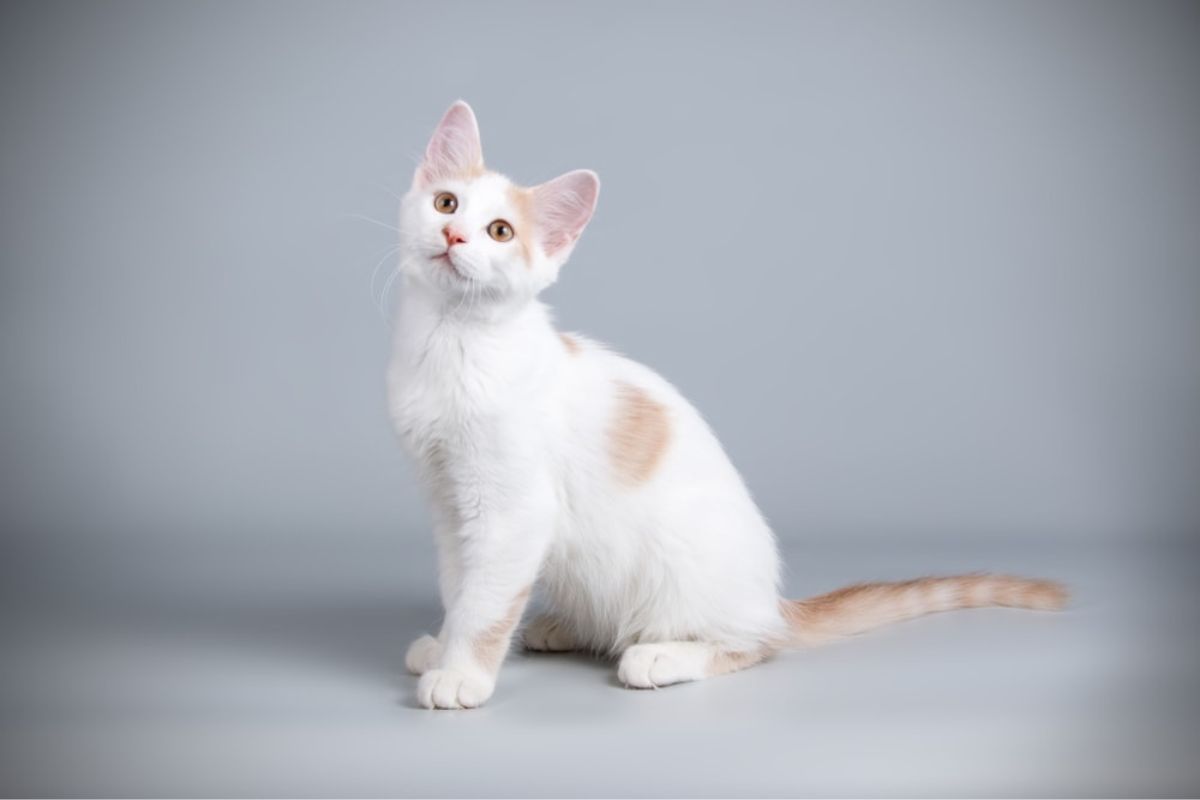The Aphrodite Giant is an enchanting breed, known for its splendid stature and gentle demeanor. It’s a magnificent companion for those who cherish the serene bond of feline friendship. Dive in further to unravel everything about this majestic breed.
Breed Overview
| Features | Details |
|---|---|
| Common Name | Aphrodite Giant |
| Scientific Name | Felis catus |
| Characteristic | Gentle, Intelligent, Loyal |
| Life Span | 12-15 years |
| Build | Large and Muscular |
| Average Weight | 10-18 lbs (4.5-8 kg) |
| Average Height | 14-18 inches (35-45 cm) |
| Coat Length | Medium to Long |
| Coat Colors | White, Black, Gray, Red |
| Coat Pattern | Solid, Tabby, and Bicolor |
| Eye colors | Green, Blue, Amber |
| Hypoallergenic | No |
| Country of Origin | Cyprus |
Physical Description
The Aphrodite Giant is a mesmerizing sight, with a robust and muscular build that exudes strength and grace. Males typically weigh between 12-18 pounds, whereas females are a bit lighter, ranging from 10-15 pounds. Height can stretch up to 18 inches, making them a towering presence.
Their medium to long coat flourishes in an array of colors including solid white, deep black, elegant gray, and rich red. Patterns vary from solid to tabby and bicolor, enriching their visual appeal. Their coat is dense yet silky, requiring regular grooming to maintain its luster.
Remarkably, their ears are tall and pointed, with a base wide enough to capture every sound with precision. This breed’s large, almond-shaped eyes sparkle in hues of green, blue, and amber, illuminating their expressive faces.
The striking difference between male and female Aphrodite Giants lies in their size and muscle mass, with males generally appearing more imposing. Despite their grandeur, they move with an unexpected nimbleness and grace, captivating all who witness their elegance.
Behavior and Temperament of the Aphrodite Giant
Aphrodite Giants are the epitome of gentle giants; despite their formidable size, they possess a serene and affectionate temperament. They’re profoundly loyal to their human companions, showing an intelligence that makes them adaptable to various households. Their calm demeanor is consistently paired with a playful undercurrent, keeping their families entertained without being overly demanding of attention.
Social and personable, they adapt well to living with families, children, and other pets, making them excellent companions. They’re known for their vocalizations, not in volume but in a melodious tone, often engaging in “conversations” with their owners. This breed thrives on interaction and mental stimulation, cherishing puzzles and games that challenge their intellect.
History and Origin
Originating from the rugged terrains of Cyprus, the Aphrodite Giant boasts an ancient lineage that mixes myth with mystery. This breed’s roots are said to date back to the island’s earliest feline inhabitants, with tales suggesting their divine namesake, Aphrodite, the Greek goddess of love and beauty, had a hand in their creation.
Discovered in the wilds of Cyprus, the Aphrodite Giant was recognized for its distinctive size and tender temperament among the local populace. It wasn’t until recent decades that formal recognition and breeding programs began, aiming to preserve their majestic traits.
This breed stands as a natural wonder rather than a product of human-designed hybridization, carrying the robust genetic heritage of Cyprus’s native cats.
Aphrodite Giant Cat Care
Caring for an Aphrodite Giant requires attentiveness to maintain their physical and emotional well-being. Their coat, while not demanding, benefits from weekly brushing to prevent tangles and matting, especially in the longer-haired individuals.
These cats cherish space to roam and explore, making environments with access to safe outdoor areas or spacious indoor territories ideal. They relish high perches and sturdy scratching posts, mimicking their natural inclination for surveying and claw honing.
Play is crucial for these intellectual creatures. Offering varied toys and interactive playtime keeps them mentally stimulated and physically fit. While they do appreciate the tranquility of indoor life, supervised outdoor adventures can provide them with enriching experiences.
Common Health Problems
The robust nature of the Aphrodite Giant renders them generally healthy, but like all breeds, they’re predisposed to certain conditions:
- Hip Dysplasia: A hereditary condition that affects larger cats.
- Heart Conditions: Routine veterinary checks are advisable for early detection.
- Dental Problems: Regular dental care can prevent most issues.
Where to Adopt or Buy Aphrodite Giant
Being a rarer breed, adopting or purchasing an Aphrodite Giant may require patience. Contacting breed-specific societies or breeders who specialize in Greek and Cypriot cats is a start. Adoption fees and purchase prices can vary widely, with a pedigreed kitten potentially costing upwards of $1,000.
Diet and Nutrition
The dietary needs of the Aphrodite Giant mirror those of other large cat breeds. A high-quality diet rich in proteins and fats supports their muscular build and energy levels. It’s key to monitor food intake to prevent obesity, especially if their exploration space is limited. Fresh water, lean meats, and occasional safe greens complement their diet well. Consultation with a veterinarian can tailor their nutrition to individual health needs, including supplements if necessary.
Comparable Breeds
If you find the Aphrodite Giant intriguing, similar breeds worth exploring include:
- Maine Coon: Known for their size and amiable nature.
- Siberian: Shares the Aphrodite’s sturdy build and lively character.
- Norwegian Forest Cat: A similarly large breed with a love for exploration.
- Ragdoll: Though more laid back, the Ragdoll shares the giant’s affectionate disposition.
For more cat breed profiles, feel free to explore our extensive collection.
FAQ’s about Aphrodite Giant
Are Aphrodite Giants good with children?
Yes, Aphrodite Giants are known for their gentle and patient nature, making them great companions for children.
Is the Aphrodite Giant an indoor or outdoor cat?
While adaptable to both, they enjoy having space to explore safely, whether indoors or in a protected outdoor area.
How much does an Aphrodite Giant kitten cost?
Prices can vary, but expect to pay upwards of $1,000 for a pedigreed kitten from a reputable breeder.

